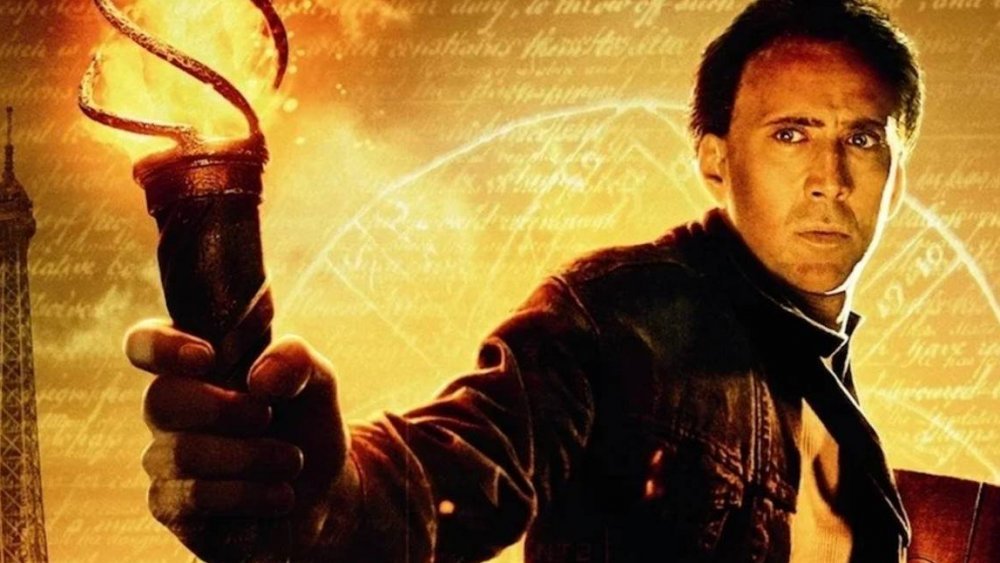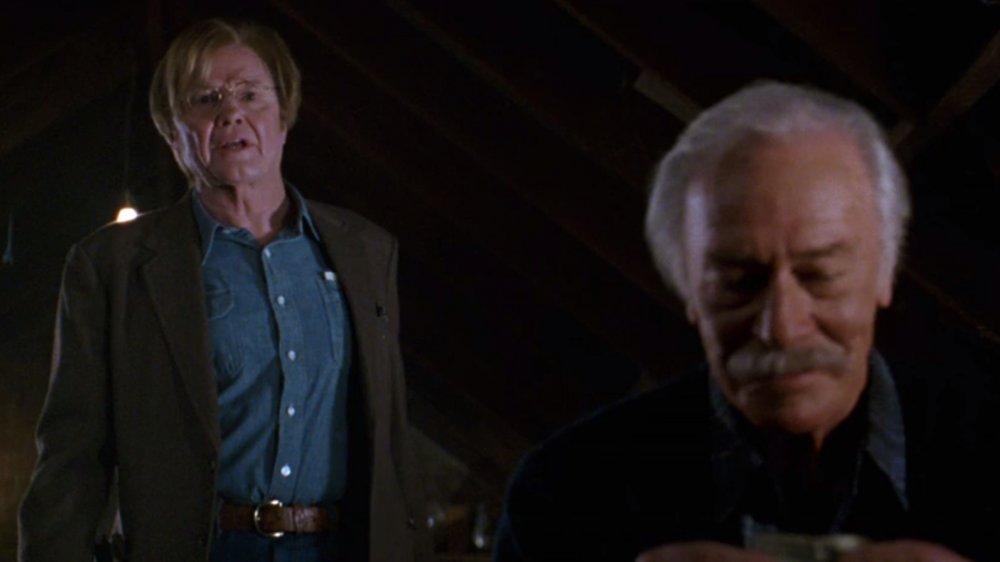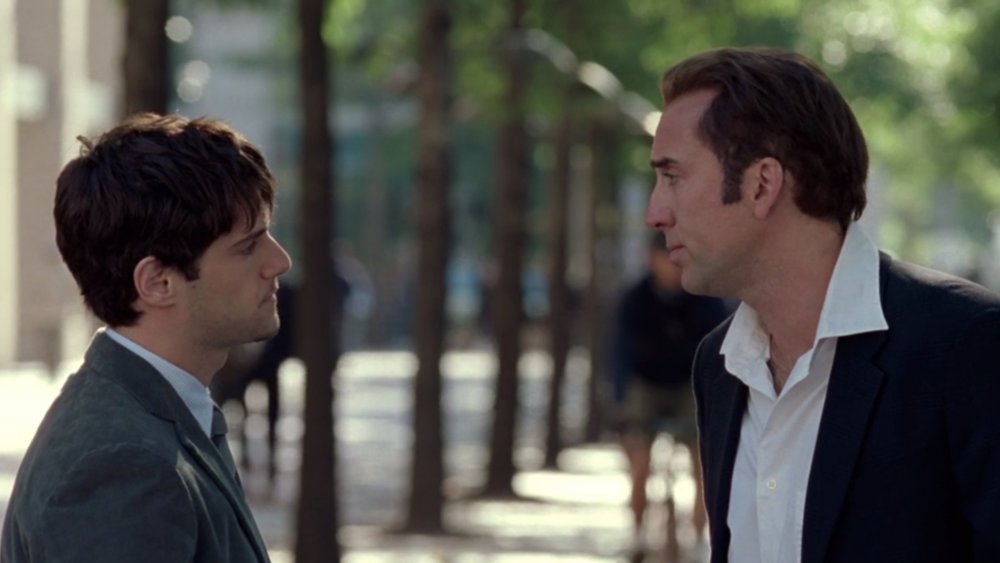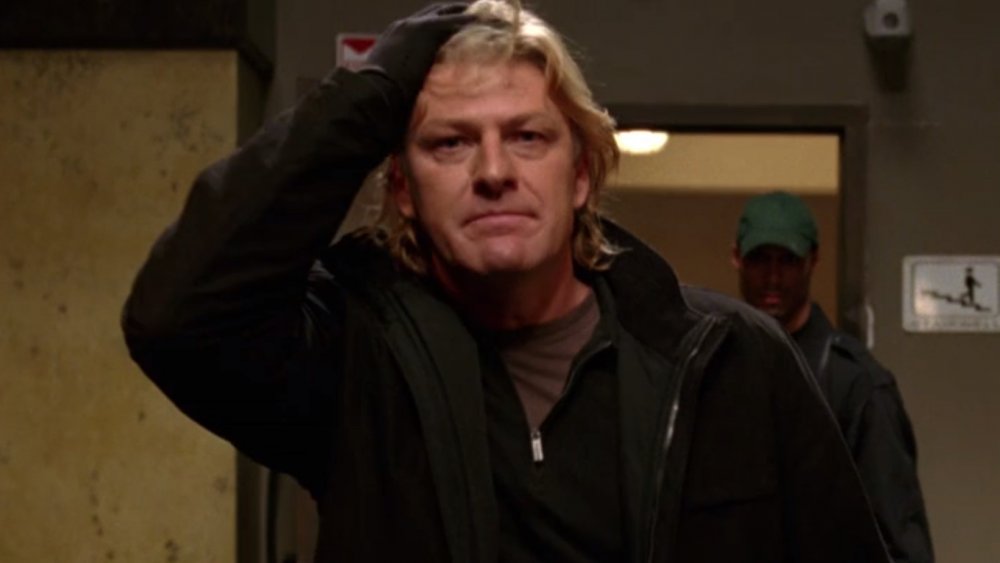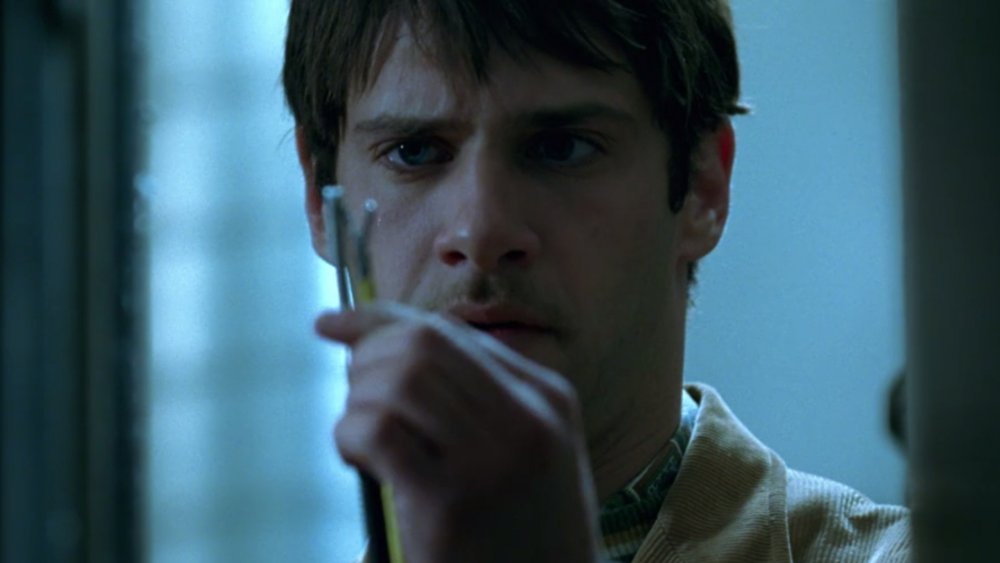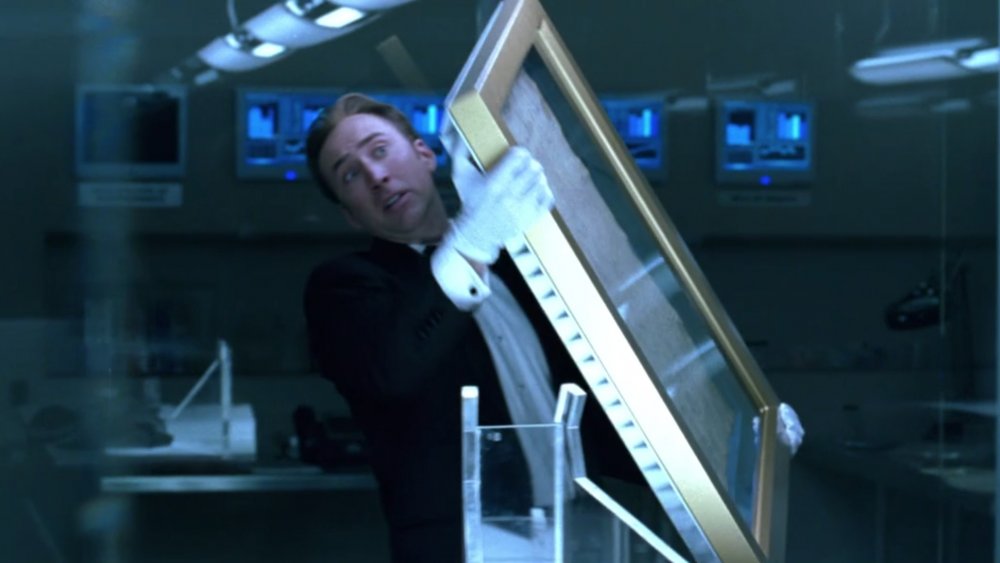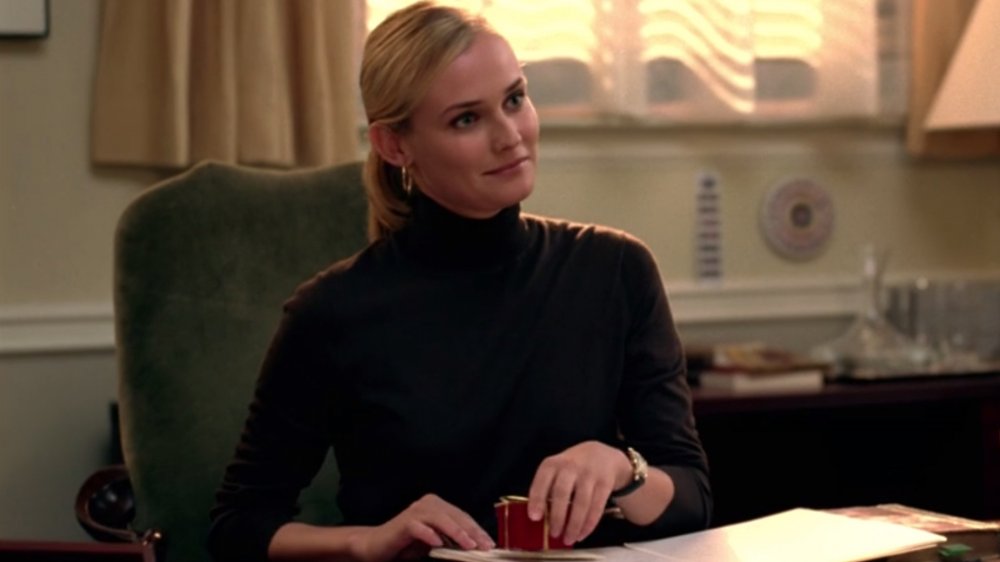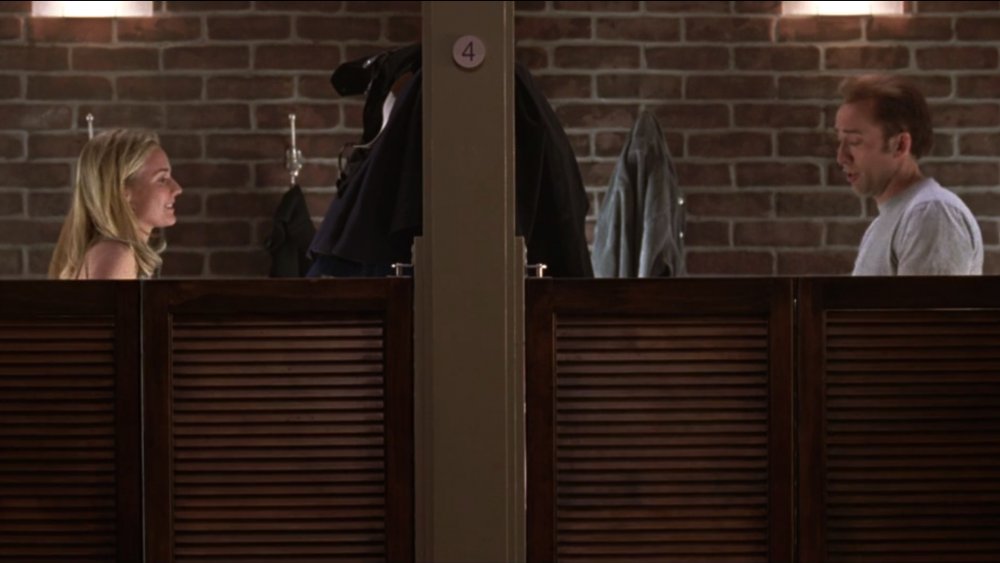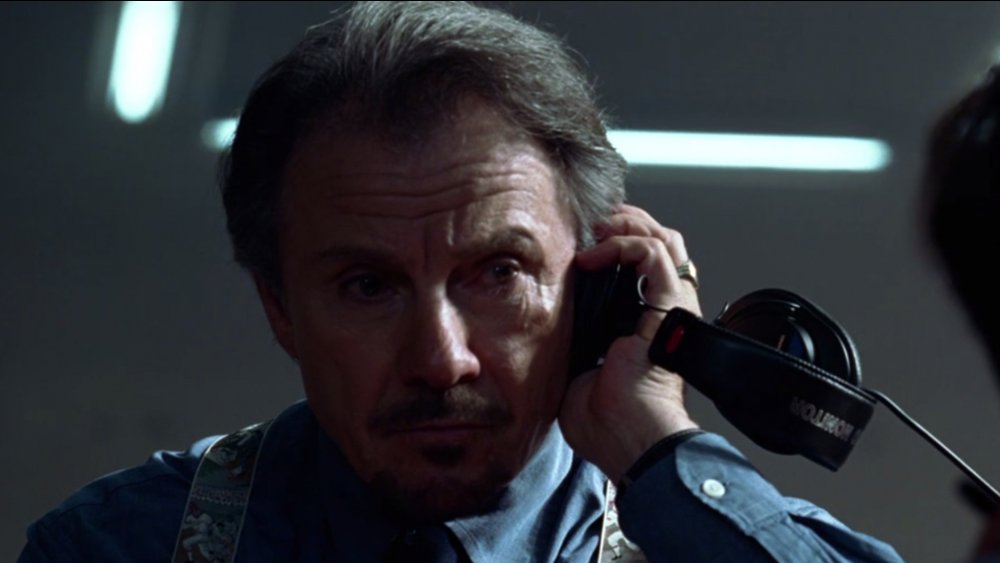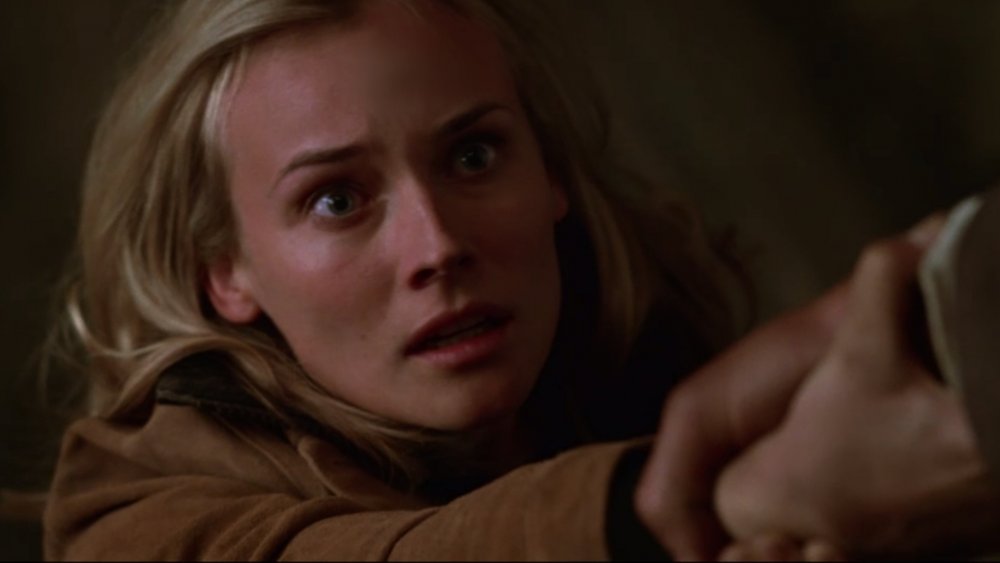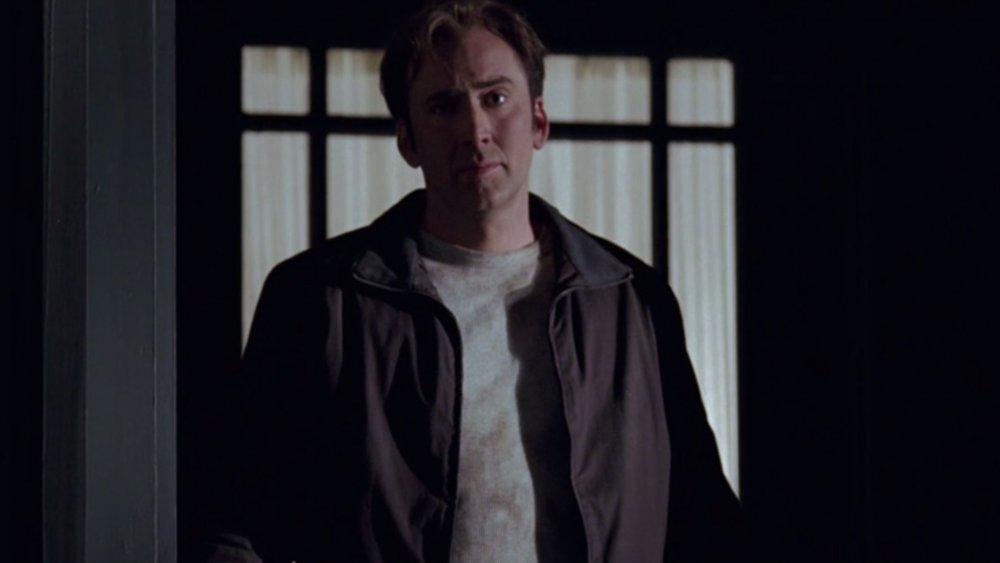Things Only Adults Notice In National Treasure
The 2004 film National Treasure not only fanned the flames of conspiracy, it also caused a large portion of kids to pay more attention in history class. The Nicolas Cage-fueled scavenger hunt appealed to parents for its heavy dose of Americana and captivated children with its whimsical promise of glory. As a child, you may not have been memorizing facts, but you certainly had a blast examining dollar bills and imagining elaborate heists.
Part of the appeal in National Treasure is its ability to weave fiction through legitimate facts and locations in real life, all driven by Nicolas Cage's dry, matter-of-fact delivery of the mundane. Benjamin Gates (Cage) displays a stubborn belief in what he knows to be true and refuses to deviate from that path. It's a characteristic that appeals to adolescents and sets him apart from his predecessor, Indiana Jones. Gates is a strong believer, while Jones is a skeptic.
The hunt for treasure still holds a special place in our hearts. However, as an adult, skepticism comes a little bit easier. While younger audiences were distracted by the British swagger of Sean Bean, the humor of Justin Bartha, and what may lie at the end of the rainbow, adults couldn't help but notice these obvious, distracting moments.
Benjamin Gates' grandfather and father look the same age
The beginning of National Treasure shows a young Benjamin Gates hunting through an attic in search of knowledge. There's dark lighting, thunder, lightning, the whole shebang. And as he removes a dusty, ornately decorated book from the cobwebs and steps down a ladder, he comes face to face with his grandfather (Christopher Plummer). The Gates' elder then tells him a family story that kicks off the whole film, all about missing treasure, the Knights Templar, and Freemasons.
But a moment later, the two are joined by Gates' father (Jon Voight), who displays his disgust for the very concept of treasure hunting. While younger audiences felt overwhelmed with the urge to prove the crotchety father figure wrong, adults were busy staring at the sandy blond hair positioned on top of Voight's wizened face. Also, immediately apparent is the fact that Voight and Plummer look about the same age, despite portraying father and son. That's because the two actors are only nine years apart. At the time of the film's release, Voight was 65 and Plummer was 74. But to a kid, old is old, and nothing seems off except for the fact that this treasure hasn't been found yet. Adults, however, may already be distracted from the mythical.
Nicolas Cage in National Treasure is every road trip with your dad
A crucial part of National Treasure is the comic relief we get from Riley (Justin Bartha). The uninterested computer wiz just wants to find this treasure and get rich. But Benjamin Gates won't simply let him do his thing until they arrive at their destination. Instead, Gates never misses an opportunity show off how big of a nerd he is by giving Riley a never-ending stream of history lessons. With each new development, Riley is subjected to a banal lecture about the history of every brick and stone. There's even a brief moment where Riley knows something about history that the rest of the group doesn't, and thankfully, he soaks up the moment because immediately after sharing his knowledge, the dynamic shifts back with little acknowledgment as to his contribution.
Sounds a bit familial, doesn't it? Anyone who's ever gone on a road trip with their dad as a kid remembers stopping at an empty field to read a plaque and knows exactly how Riley feels. And it's that history vacation vibe that makes their dynamic so funny and so relatable to the grown-ups watching. Now imagine if each time your family minivan stopped off at some historic boulder, there was a group of trigger-happy thugs not far behind. Yeah, it would definitely put a damper on learning about that 200-year-old pole or that ancient rock.
Do as I say, not as I do
The first clue given to Gates is aboard a ship called The Charlotte, and in order to reach its arctic location, he enlists the help of a mysterious benefactor named Ian (Sean Bean). When the two discover that the next clue is on the back of the Declaration of Independence, they quickly conclude that the only way to find out for sure would be to steal it. However, Gates refuses to help Ian steal the historical document, so the two beef it out and blow up a ship, which lays out the good versus evil battle for the rest of the two-hour scavenger hunt.
Gates had dedicated his entire life to the pursuit of a treasure beyond all imagining. It displays nobility that he refuses to endanger the Declaration of Independence even though they're closer to achieving his life's pursuit. But then he twists his own logic around and decides that in order to protect the document, he must steal the document. Wait, what?!
So, rather than just work with Ian (who financed you up until this point), you told him no and then went off to do the same thing without him? That's pretty inconsiderate. Ian may have had experience in operations of "questionable legality," but at every junction, he lays out his requests reasonably and is constantly telling his men to calm it down with all the shooting. All the turmoil that developed throughout the film could've been avoided had Gates worked with Ian to do the same thing he was going to do anyway. The Declaration of Independence would've still been stolen, but no one would've been shot at. The FBI wouldn't be on their heels. Also, as a little bonus, they still would've found the treasure.
Hacking into a government building looks pretty simple in National Treasure
Before they commit to stealing the Declaration of Independence, in true heist fashion, Riley lays out the impossibility of it all. The building is a fortress, and there are sensors, thermal monitoring, a vault surrounded by loads of concrete — you know, the usual. Considering this is the most important document in the history of the United States, it would stand to reason that the entire building would be airtight but not quite. It's nothing that a power tool and a laptop can't penetrate.
And seriously, what's with the room that Riley just walks into and hooks up to the security cameras? Sure, your technological van guy needs eyes on the facility, but you would think a government building would have a few hoops to jump through. But not in National Treasure. No hoops at all. Riley waltzes into some random room that's unlocked and hooks up to the building's security cameras through a tube of wires. Now we're starting to see why being a bank robber seemed doable as a kid.
In National Treasure, the Declaration is pretty easy to steal
In National Treasure, the characters spend a large amount of time explaining how impenetrable the security is around the Declaration of Independence. Gates and Riley are laughed out of both the FBI and Homeland Security for even suggesting that it could be stolen. The quick little CGI demonstration of the document being lowered into its vault makes it seem pretty secure. Well, except when it's moved to a different room on the same weekend as a big gala, where it's guarded by one security guard.
Aside from the coincidental nature of the soirée they use to mask their heist, adults watching National Treasure were also left wondering why an entire section of the building was completely empty. A suave, tuxedoed Nicolas Cage saunters in and then scurries out carrying the whole case. There's even a second way to penetrate the building's defenses, which Ian takes through a series of sewers and vents. By this point in the film, it's apparent that nothing they're doing is all that difficult.
However, this adds to the film's appeal. It's not about the level of difficulty but more about the gathering of the necessary knowledge. All these clues were hidden in plain sight, and we just needed to know where to look. Still though, can we have them maneuver past more than just one friendly security guard? It is the Declaration of Independence, after all.
Abigail Chase can't type, luckily
There are simple projects we did in school that stick with us for years, like baking soda volcanoes and macaroni drawings. It's apparent that National Treasure's screenwriters dove back into their childhood to bring back the enchanting invisible ink project — all it takes is some lemons and a blacklight!
Aside from the adolescent novelty of it all, it's a pretty big leap to assume that Abigail Chase (Diane Kruger) would appropriately handle the historic George Washington button gifted to her, saturating her fingers with the lemon concoction that Gates covered the button in. Her fingers then somehow retain enough of the fluid during her walk from her office down to the lower-level archives where they're applied to a security checkpoint keyboard.
Plus, this entire plan hinged on the fact that an archivist working at the National Archives types with one finger. Kids are dazzled by the glowing fingerprints that present yet another puzzle to solve. Meanwhile, adults can't help but squint at the screen as Abigail forcefully punches in each individual letter on the keyboard. So yeah, it's pretty bold for this movie to presume that a blonde can't type.
Why does Patrick Gates have so many lemons?
There's a whole lot of lemon action happening in National Treasure. In addition to the compound that Gates makes to figure out Abigail's password, these fruits help our heroes decipher a code on the back of the Declaration of Independence. After the characters have stolen the document, they find themselves at Patrick Gates' (Voight) house, examining the historical parchment. And it's a good thing there's a lemon nearby so they can gingerly swab the document in search of a hidden map.
Once they discover it works, they seek out more lemons. In most households, a lemon or two may be standard. Those couple of lemons may even sit in the fridge for weeks until their purpose is revealed. But history buffs dance to a different tune, apparently.
Patrick Gates appears to lead a life of solitude, complete with pizza and soda for dinner in his bachelor pad, surrounded by history relics and books. Fellow adults were left wondering why such a man has a large portion of his fridge space being taken up by a large bowl of lemons. Perhaps the Gates patriarch is fighting off a kidney stone, or maybe sucking the sour citrus down to the rind each morning helps him feel alive. Whatever the reason, the treasure hunters are lucky he's such a fan of lemons.
What's with the weird adjacent changing rooms?
At one point in the film, Benjamin Gates and his crew are about to head off in search of their next clue ... but they first stop off to change clothes. While changing in separate stalls, Gates and Chase display a rare moment of chemistry. Changing rooms in every store across America are a private endeavor, complete with personal lock and his and her sections. Even from a progressive standpoint though, the changing rooms these two are conversing in seem a bit revealing. The way the shot is set up also makes it appear as though the entire store is able to look in on them changing.
They're stripping down to their skivvies with two weird Old West saloon doors barely covering them up to about chest height. It's certainly a different setup from the usual Urban Outfitters. While we'd like to believe that it's a quiet statement about equality and not being ashamed of our bodies, it's mostly obvious that the filmmakers wanted a still frame shot of both the stars talking. And while we don't know for sure, we're willing to guess that Disney laid out exactly how much skin could be shown, and they cut their little saloon doors out to their exact specifications.
What's up with the FBI in National Treasure?
When there's an incident like someone stealing the Declaration of Independence, it stands to reason that the FBI would be called in to hunt down the perpetrators. After all, the FBI has a vast arsenal of knowledge and resources at their disposal. The leader of the task force, Sadusky (Harvey Keitel), has all the characteristics of a smart and efficient team leader. But despite all these attributes, there seems to be little noise heard about the British gunmen chasing Americans across the country, firing clip after clip around national monuments.
There are several instances when loads of bullets are unloaded at Gates and the gang. National Treasure filmmakers would have you believe that the silencers the bad guys have on their guns mask all the mayhem in obscurity, but adults see right through the facade. Silencers don't completely silence the sound of a gunshot, and it's hard to ignore a woman and two men running for their lives while being chased by burly men brandishing pistols.
So ... not a single alert was passed along to the FBI about any of this? Evidently not. In fact, the upper echelon of investigation observed Gates buying something with a credit card at a party he wasn't invited to, and they ran with it hard. So much for innocent until proven guilty.
Trust me to drop you
The Declaration of Independence spends most of National Treasure encased in a sturdy tube within another sturdy tube. It gets blow-dried. It gets covered in lemon juice. It gets thrown into traffic. But luckily, it doesn't fall a few stories in a mine shaft, thanks to the quick thinking and impeccable timing of the one and only Nicolas Cage.
Historical significance aside, there's little doubt that every adult couple watching National Treasure got a sideways glance when Ben dropped Abigail in order to save the tube of history. The logical decision would've been to save the girl and let the document drop down the shaft safely in its durable casing. They were all headed down to the bottom anyways.
Even Ben can't believe he made that choice. When Abigail says she would've done the same thing, he stares back at her, bewildered, and whimpers, "Really?" The chemistry between the two leads is off, and it rubs any grown human the wrong way. The young National Archive employee went from her posh office to being kidnapped, shot at, and dropped down a mine shaft, then succumbs to the charms of a 40-year-old treasure hunter ... who was the one who dropped her by the way. Seems reasonable.
Who's that hiding in the shadows?
Quick thinking and vast historical knowledge across two generations leaves the crew stranded at the bottom of some catacombs but free of Ian's strong-arm tactics. And once our heroes escape back out into fresh air, Ben contacts the FBI and offers Sadusky someone to send to jail. The Freemason obliges and sets off to arrest Ian for a slew of charges. Benjamin Gates tags along because the discovery of an enormous treasure room isn't enough for the glory hunter. The historian portrays an urge to rub it in Ian's face with some drama.
When Sadusky arrests Ian outside the church he was led to, Gates steps out from the shadows in a nearby doorway to smile at Ian. It stands to reason that all the FBI agents were positioned nearby, ready to pounce, but what was Ben's story there? The man went from facing a lifetime in prison to having the FBI let him lurk on someone's front porch in the shadows. There must have been a significant amount of time that he was waiting there, hiding from the light.
It does make the ending pretty humorous, picturing Nicolas Cage hiding in a dark doorway, brimming with excitement as he hears the chains on the nearby church clink against the bolt cutters. The history dork having to apply every ounce of his patience not to reveal himself as he hears the sirens approaching. Then the breathing exercise he implements while Sardusky reads Ian his rights. Now is his moment. A smug Ben steps into the light.
